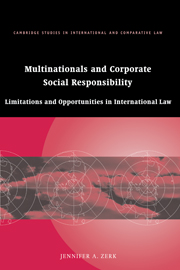 Multinationals and Corporate Social Responsibility
Multinationals and Corporate Social Responsibility Book contents
- Frontmatter
- Contents
- Preface
- Table of treaties, declarations and other international instruments
- Table of cases
- Table of statutes and statutory instruments
- List of abbreviations
- Introduction
- Part I Regulatory issues and problems
- 1 Multinationals and corporate social responsibility: a new regulatory agenda
- 2 Multinationals under international law
- 3 Multinationals under national law: the problem of jurisdiction
- Part II Home state regulation of multinationals
- Part III International regulation of multinationals
- Bibliography
- Index
- CAMBRIDGE STUDIES IN INTERNATIONAL AND COMPARATIVE LAW
1 - Multinationals and corporate social responsibility: a new regulatory agenda
Published online by Cambridge University Press: 23 July 2009
- Frontmatter
- Contents
- Preface
- Table of treaties, declarations and other international instruments
- Table of cases
- Table of statutes and statutory instruments
- List of abbreviations
- Introduction
- Part I Regulatory issues and problems
- 1 Multinationals and corporate social responsibility: a new regulatory agenda
- 2 Multinationals under international law
- 3 Multinationals under national law: the problem of jurisdiction
- Part II Home state regulation of multinationals
- Part III International regulation of multinationals
- Bibliography
- Index
- CAMBRIDGE STUDIES IN INTERNATIONAL AND COMPARATIVE LAW
Summary
Multinationals are among the most controversial players on the international stage today. But what are multinationals? And why are people so concerned about them? Is it possible to regulate multinationals effectively? Or are they, as many people believe, ‘beyond the law’?
As this chapter will show, concerns about multinationals have developed and changed over time. Historically, public opposition to multinationals has arisen mainly from concerns about undue concentrations of power, and their implications for national sovereignty and cultures. In recent years, however, there has been a shift in emphasis away from these ‘state-centred’ concerns towards more ‘people-centred’ concerns, such as the environment and human rights. As will be seen, the CSR movement has played no small part in this.
Most, if not all, leading companies now have strategies relating to CSR. Over the past few years there has been an explosion in management, assurance and reporting standards designed to help companies become more ‘socially responsible’ and to measure and report on their progress. Governments, too, have been forced to re-evaluate their policies on industry and enterprise to reflect these new concerns. Already, some new regulatory proposals and initiatives have appeared at national and regional level, designed to enhance ‘corporate accountability’. These will be explored further in chapter 4. Generally, though, governments of capital-exporting states like the UK and USA are reluctant to take steps which may harm the ‘international competitiveness’ of their industrial sector and for this reason tend to favour a ‘voluntary’ approach to CSR.
- Type
- Chapter
- Information
- Multinationals and Corporate Social ResponsibilityLimitations and Opportunities in International Law, pp. 7 - 59Publisher: Cambridge University PressPrint publication year: 2006
- 1
- Cited by
